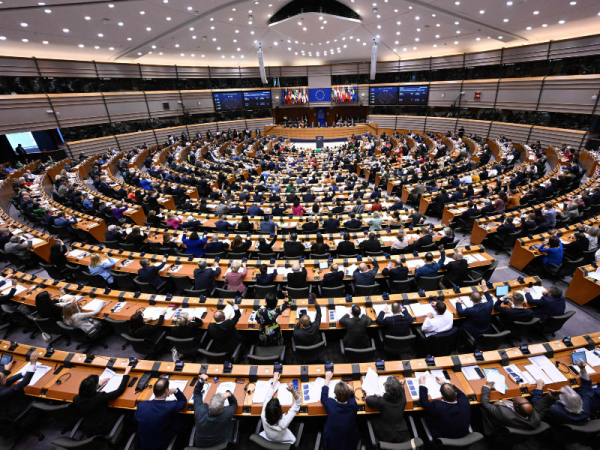
Members of the European Parliament took part in a series of votes during a plenary session in Brussels on Wednesday, 10 April 2024. The lawmakers, somewhat surprisingly, approved a long-debated pact on measures to expedite asylum and security procedures at the external borders of the 27-country bloc. (John Thys – AFP / Lehtikuva)
- Next Article Reports: Pensions on agenda as government looks for cost savings in April
THE EUROPEAN PARLIAMENT on Wednesday approved a long-debated pact consisting of ten asylum and migration-related bills.
The pact sets forth, for example, mandatory solidarity actions toward member states that are under exceptional pressure from a surge of asylum applications. The other member states can decide whether to demonstrate solidarity by receiving a share of asylum seekers, providing funding or providing operational or technical support.
The aim of the revamp is to expedite asylum and security procedures at the external borders of the 27-country bloc, and increase returns to reduce irregular arrivals from regions such as Africa and the Middle East. A compromise on the pact was reached yesterday after almost ten years of disagreements between member states, just in time for the pro-EU political centre to leverage it to curb the gains of the far-right in the elections taking place in June.
Predictions made before the vote suggested that it was uncertain whether the pact would win the requisite support from lawmakers, wrote STT.
“Now the EU can regain control of our external borders, reduce economic migration and put in place a common migration policy that is well functioning and fit for the long-term union,” Tomas Tobé, a Swedish MEP from the European People’s Party, rejoiced on X on Wednesday.
Tobé was one of the rapporteurs of the pact.
The pact drew criticism from both flanks of the political spectrum, for different reasons. Populist, anti-immigration, and far-right parties criticised it for failing to put a stop to irregular immigration, whereas left-wing parties and rights watchdogs have expressed their concern about its ramifications for human rights.
For example, Amnesty warned that the revamp will increase both human suffering and the risk of human rights violations at the borders of Europe.
The pact also comments on instrumentalised immigration, a phenomenon that has been witnessed on the eastern border of Finland. The proposed measures for such emergencies were designed to ensure the target of instrumentalised migration receives support from other member states.
STT on Wednesday reminded that the Finnish government has adopted a relatively lukewarm stance on the notion of mandatory burden-sharing. Although the government programme states that the government will lobby for a voluntary burden sharing, it is expected that the current government is ready to approve of the mechanism.
Minister for European Affairs and Ownership Steering Anders Adlercreutz (SFP) in December stated to the news agency that the government would decide on a case-by-case basis whether it demonstrate solidarity by receiving asylum seekers or provide funding.
Most EU member states are expected to rubber stamp the agreement later this month, according to Reuters.
Aleksi Teivainen – HT
- Next Article Reports: Pensions on agenda as government looks for cost savings in April
Source: www.helsinkitimes.fi
